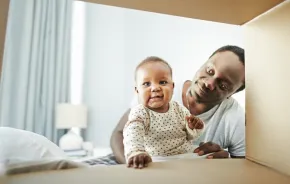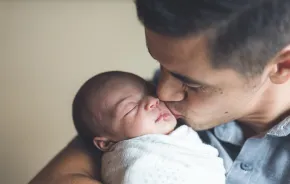 There is plenty of parenting advice out there, and no shortage of books that offer information and support to new and expecting parents. But where advice meets brain science you’ll find the newest book by New York Times bestselling author John Medina, Brain Rules for Baby.
There is plenty of parenting advice out there, and no shortage of books that offer information and support to new and expecting parents. But where advice meets brain science you’ll find the newest book by New York Times bestselling author John Medina, Brain Rules for Baby.
Medina is a developmental molecular biologist, but don’t let that scare you. While he backs up his arguments with scientific fact, he spells it all out in a style that’s accessible to even the most exhausted parent. At a recent lecture in Seattle, Medina laid out some of his most compelling findings about babies’ brains — and the best way to nurture them.
Safety above all
Medina says he’s often asked (usually by dads), “What’s the best way to get my kid into Harvard?” His (somewhat curt) answer? “Go home, help around the house and make your wife happy.”
In fact, according to Medina, a calm and happy home is crucial for developing baby brains. That’s because a baby’s brain seeks a safe environment above all else, says Medina. “An infant’s need for caregiver stability is so strong, she will rewire her developing nervous system depending upon the turbulence she perceives,” he writes.
That’s not to say that parents can’t ever fight — just make sure the kids see you making up with each other, too. “Kids are good with occasional turbulence as long as resolutions exist, as long as there’s a public display of it,” says Medina. So if children see someone’s feelings being wounded, make sure they see them being bandaging, too.
Deal with emotions
Those grocery-store tantrums are actually a chance to nurture brain growth, too, according to Medina. “The data are clear,” Medina told a packed house at Seattle’s Town Hall. “The single most important battlefield is what a parent does when their kids’ emotions are intense.” Think about what you do when your child is sad about something. Do you ignore them? Spank them? Tell them to just get over it? Medina says a caring show of empathy will go a long way towards your baby’s emotional health.
After hearing Medina speak, Bothell mom Angela Schaffer reflected that just that day she had told her 3-year-old daughter to stop crying over a minor scrape at home. “In hindsight, it probably was not the best response,” says Schaffer, but with a newborn son to take care of, as well, “I really just needed her to get over it.”
The good news, says Medina, is that parents do not need to be perfect every time. “Deploy the right empathetic response 30 percent of the time, and you see benefits!”
Debbie Altomare, a teacher at Mercer Island’s Pixie Hill Preschool, uses “feeling babies” for teaching young children about empathy and emotions. These are stuffed bears that Altomare has dubbed Baby Blue, Happy Harriet, Mad Mark and other names reflecting emotions. (She is careful to rename a bear if there is a child in class with that name.)
The preschoolers pass around the small stuffed animals, which have emotions displayed on their faces and are color-coded to match the feeling. Altomare talks about the emotion each bear represents, sometimes having the children listen to complementary music. “They are learning how to verbalize their feelings,” she says, “and they know that it is OK to feel this way.” Altomare now shares the concept of her feeling babies with others at conferences around the area.
The academic connection
Why is this so important? “A child’s brain can be trained to enhance self-control and other aspects of executive function,” according to Medina, and building executive function is one way to help that baby get to Harvard. Says Medina: “Executive function is actually a better predictor of academic success than IQ [is].”
So, the next time you are driving around with your child, try verbalizing your own emotions: “I am so tired of this rain. It makes me grumpy!” Who knew that getting that off our chests could be good for the kids, too?
For working parents, Medina says other caregivers must practice the same techniques. Ask a prospective sitter or nanny what they would do when a child throws a tantrum. “Don’t give them too much time to think,” he says. “You want the reflexive reaction, not giving them time to look for the right answer.” Seek out a caregiver who hugs and talks through issues with your child.”
‘Parenting is not a race’
Medina points out that this involved, empathetic style of parenting is a world away from what he calls hothouse parenting or hyper-parenting, in which extreme expectations stunt higher-level thinking and continual disappointment becomes toxic stress. “Write this across your heart before your child comes into the world: Parenting is not a race. Kids are not proxies for adult success.”
The father of two boys, Medina brings to light many of his own parenting experiences — and those of plenty of other parents — in Brain Rules. In the end, the scientist says, brain rules are really rules of the heart. “I said that parenting is all about developing human brains, but my aim was inches too high. Parenting is all about developing human hearts.”
Hilary Benson is a regular ParentMap contributor and a mother of three who lives in the Seattle area.











